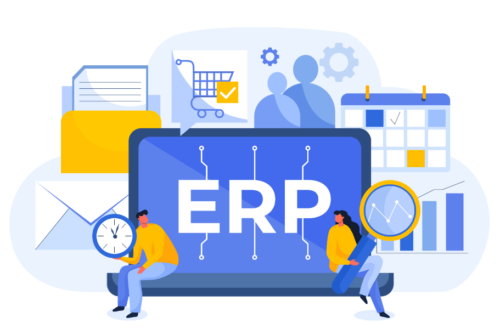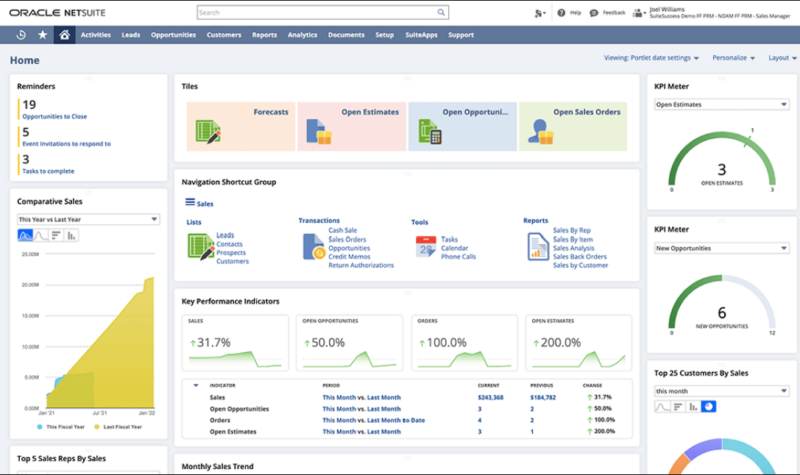Discover the ultimate ERP solution – unmatched efficiency, scalability, and innovation. Elevate your business with the best ERP software.
In today’s rapidly evolving business landscape, staying competitive and efficient is essential for success. One powerful tool that can help your business thrive is an Enterprise Resource Planning (ERP) system.
This comprehensive guide will walk you through everything you need to know about selecting and implementing the best ERP solution for your organization.
The Future of Business Management: Exploring the Best ERP Software
What is an ERP System?
Enterprise Resource Planning (ERP) is a suite of integrated software applications that enable organizations to manage and automate various business functions. These functions can include finance, human resources, inventory management, customer relationship management, and more.
ERP systems provide a centralized database that allows different departments to access and share real-time information, leading to improved collaboration and efficiency.
Why Does Your Business Need ERP?
In today’s competitive market, businesses are constantly seeking ways to optimize their operations. ERP systems provide a holistic view of an organization’s processes, enabling better decision-making, reducing manual errors, and enhancing productivity. Whether you are a small startup or a large enterprise, implementing an ERP system can help you stay agile and responsive to changing market conditions.
Types of ERP Systems
– Cloud-Based ERP
Cloud-based ERP solutions are hosted on remote servers and accessed through the internet. They offer flexibility, scalability, and lower upfront costs, making them an attractive option for businesses of all sizes. With cloud ERP, you can access your data and applications from anywhere, promoting remote work and collaboration.
Enterprise Resource Planning (ERP) systems are a vital component of modern business management. Traditionally, ERP systems were hosted on on-premises servers, requiring substantial investments in infrastructure and maintenance.
However, the advent of cloud technology has revolutionized the ERP landscape. Cloud-based ERP solutions have gained widespread popularity due to their flexibility, scalability, and cost-effectiveness. Here’s a closer look at cloud-based ERP and why it’s transforming the way businesses operate:
1. Accessibility from Anywhere
One of the standout features of cloud-based ERP is its accessibility. Unlike on-premises systems, cloud ERP can be accessed from anywhere with an internet connection. This mobility empowers employees to work remotely, access critical data in real-time, and collaborate seamlessly across locations. This flexibility has become especially crucial in today’s remote and distributed workforce.
2. Cost Savings
Cloud-based ERP eliminates the need for significant upfront investments in hardware and infrastructure. Instead, businesses pay a subscription fee based on their usage. This cost model allows organizations to allocate resources more efficiently, as they only pay for the features and capacity they need. Additionally, maintenance and updates are managed by the ERP provider, reducing IT overhead.
3. Scalability
Businesses are not static; they evolve and grow. Cloud-based ERP systems can scale easily to accommodate your changing needs. Whether you’re a small startup or a large enterprise, you can adjust your subscription to match your requirements, ensuring that your ERP system grows with your business.
4. Automatic Updates
Staying up-to-date with the latest software versions and security patches is crucial for data integrity and cybersecurity. With cloud-based ERP, updates are typically handled automatically by the provider. This means you can enjoy the benefits of the latest features and security enhancements without the hassle of manual updates.
5. Data Security and Disaster Recovery
Cloud ERP providers prioritize data security. They invest in robust security measures, including data encryption, user authentication, and regular security audits. Additionally, cloud-based ERP systems often include disaster recovery and backup services, ensuring that your data is safe and recoverable in case of unforeseen events.
6. Integration Capabilities
Seamless integration with other business applications is essential for maximizing productivity. Cloud-based ERP systems are designed with integration in mind. They can easily connect with Customer Relationship Management (CRM) software, e-commerce platforms, and other tools, streamlining data flow and reducing data silos.
7. Global Reach
Cloud-based ERP is well-suited for businesses with a global presence. It enables centralized management of operations across multiple locations, providing a single source of truth for data. This centralization improves consistency, facilitates compliance, and enhances decision-making.
8. Collaborative Workflows
Cloud ERP fosters collaboration by allowing multiple users to work on the same data simultaneously. This collaborative approach improves efficiency and ensures that everyone is working with the most up-to-date information.
– On-Premises ERP
On-premises ERP systems are installed and maintained on your company’s own servers and hardware. While they provide greater control over data security and customization, they often require higher initial investments and ongoing maintenance.
– Hybrid ERP
Hybrid ERP solutions combine elements of both cloud-based and on-premises systems. This hybrid approach allows businesses to enjoy the benefits of both worlds, tailoring the ERP system to their specific needs.
Benefits of Implementing ERP
– Streamlined Operations
ERP systems streamline business processes by eliminating redundant tasks and automating workflows. This leads to increased operational efficiency and reduced operational costs.
– Improved Data Accuracy
With a centralized database, ERP systems ensure data consistency and accuracy. This minimizes errors in reporting and decision-making, fostering trust in your organization’s data.
– Enhanced Decision-Making
Access to real-time data and analytics empowers organizations to make informed decisions quickly. Whether it’s inventory levels, sales trends, or employee performance, ERP systems provide actionable insights.
Key Features to Look For
– Scalability
Choose an ERP system that can grow with your business. Scalability ensures that the software can adapt to your changing needs as your organization expands.
– Integration Capabilities
Look for an ERP solution that seamlessly integrates with your existing software applications, such as CRM or e-commerce platforms. Integration reduces data silos and enhances data flow.
– Customization Options
Every business is unique. Ensure that the ERP system allows for customization to meet your specific business processes and requirements.
Selecting the Right ERP Vendor
– Research and Comparison
Before choosing an ERP vendor, conduct thorough research and compare available options. Consider factors such as functionality, user-friendliness, and customer support.
– Vendor Reputation
Check the reputation of the ERP vendor. Read customer reviews, request references, and inquire about their track record in implementing solutions similar to your needs.
– Total Cost of Ownership (TCO)
Evaluate the TCO of the ERP system, which includes not only the initial purchase price but also ongoing costs such as maintenance, support, and training.
Preparing for ERP Implementation
– Data Migration
Plan for the migration of existing data into the ERP system. Ensure data accuracy and completeness during this crucial phase.
– Employee Training
Invest in comprehensive training for your employees to ensure they can effectively use the new ERP system.
– Change Management
Prepare your organization for change by communicating the benefits of the ERP system and involving employees in the transition process.
The Implementation Process
– Planning Phase
During the planning phase, define your objectives, set a budget, and establish a project timeline. Identify key stakeholders and form an implementation team.
– Configuration Phase
Configure the ERP system to align with your business processes. Customize settings, workflows, and reporting tools.
– Testing Phase
Thoroughly test the ERP system to identify and resolve any issues or discrepancies before rolling it out to the entire organization.
– Go-Live Phase
After successful testing, implement the ERP system across your organization. Provide ongoing support and training to users.
Measuring ROI and Success
– Key Performance Indicators (KPIs)
Determine KPIs to measure the success of your ERP implementation. These may include improved process efficiency, cost savings, and increased revenue.
– Continuous Improvement
ERP is not a one-time solution. Continuously evaluate your ERP system and make adjustments to optimize its performance.
Common ERP Implementation Challenges
– Resistance to Change
Employees may resist adopting new technology. Address this challenge through effective communication and training.
– Data Security Concerns
Protect sensitive data by implementing robust security measures and access controls.
– Technical Issues
Be prepared for technical glitches and have a plan in place to address them promptly.
Case Studies: Successful ERP Implementations
– Company A: Manufacturing
Company A streamlined its manufacturing processes, reducing lead times and improving product quality after implementing an ERP system. This led to a 20% increase in production efficiency.
– Company B: Retail
Company B integrated its ERP system with its online and brick-and-mortar stores, resulting in better inventory management and a 15% boost in customer satisfaction.
– Company C: Healthcare
Company C enhanced patient care by implementing an ERP system that improved appointment scheduling, reduced billing errors, and increased patient satisfaction by 25%.
Future Trends in ERP
– AI and Machine Learning Integration
Expect AI and machine learning to play a more prominent role in ERP systems, offering predictive analytics, automation, and smarter decision-making capabilities.
Artificial Intelligence (AI) and Machine Learning (ML) have revolutionized the way businesses operate in today’s digital age. These technologies offer powerful tools that can enhance decision-making, automate tasks, and unlock valuable insights from data. Integrating AI and ML into your business processes can provide a competitive advantage and drive innovation. Here’s a closer look at how AI and Machine Learning integration can benefit your organization:
1. Data-Driven Insights
AI and ML can analyze vast amounts of data quickly and efficiently. By integrating these technologies, your business can gain actionable insights from data sources such as customer behavior, market trends, and operational metrics. These insights can inform strategic decisions, helping you identify growth opportunities and potential risks.
2. Automation of Repetitive Tasks
AI and ML excel at automating repetitive and time-consuming tasks. Whether it’s data entry, customer support, or routine administrative work, integrating AI-driven automation can free up your employees to focus on higher-value activities. This not only increases productivity but also reduces the risk of human errors.
3. Personalized Customer Experiences
AI-powered algorithms can analyze customer data to provide highly personalized experiences. From recommending products to tailoring marketing messages, AI-driven personalization can significantly improve customer satisfaction and loyalty. This level of customization can lead to increased sales and customer retention.
4. Enhanced Predictive Analytics
Machine Learning models can predict future trends and outcomes based on historical data. This predictive capability is invaluable for demand forecasting, inventory management, and risk assessment. By integrating ML into your business processes, you can make more accurate forecasts and plan accordingly.
5. Optimized Operations
AI and ML can optimize various aspects of your operations, such as supply chain management and resource allocation. These technologies can adapt to changing conditions in real-time, ensuring that your business operates efficiently even in complex and dynamic environments.
6. Fraud Detection and Security
AI and ML are essential tools for identifying unusual patterns and anomalies in data. They are instrumental in fraud detection and cybersecurity. By integrating AI-driven security measures, your organization can protect sensitive data and financial assets more effectively.
7. Chatbots and Virtual Assistants
AI-powered chatbots and virtual assistants can provide 24/7 customer support, answer frequently asked questions, and guide users through various processes. Integrating these tools into your website or customer service channels can enhance user experiences and reduce response times.
8. Continuous Learning and Improvement
One of the remarkable aspects of AI and ML is their ability to learn from new data. As your business evolves and collects more information, these systems can adapt and improve their performance over time. This continuous learning process ensures that your AI and ML solutions remain relevant and effective.
– Mobile ERP Applications
Mobile ERP apps will become increasingly popular, allowing employees to access critical data and perform tasks on the go.
Enterprise Resource Planning (ERP) systems have traditionally been associated with desktop applications and on-premises installations. However, in today’s fast-paced business landscape, mobility is key. To keep up with the demands of a mobile workforce and evolving customer expectations, ERP software providers have developed mobile ERP applications. These applications empower businesses by providing anytime, anywhere access to critical business data and processes. Here’s why mobile ERP applications matter and how they can benefit your organization:
1. Accessibility and Flexibility
Mobile ERP applications break the chains of office-based work. They allow employees to access essential business information and functions from their smartphones or tablets, whether they are in the office, on the road, or working remotely. This accessibility ensures that your team remains productive and responsive, even when away from their desks.
2. Real-Time Data Insights
In a dynamic business environment, real-time information is invaluable. Mobile ERP applications provide up-to-the-minute data on inventory levels, sales figures, production schedules, and more. Decision-makers can stay informed and make critical choices on the spot, contributing to agility and competitiveness.
3. Improved Collaboration
Mobile ERP fosters collaboration among team members, suppliers, and customers. With mobile access, employees can share information, approve workflows, and communicate seamlessly. This collaboration enhances productivity and customer service by reducing delays and bottlenecks.
4. Enhanced Customer Engagement
Your sales and customer service teams can benefit immensely from mobile ERP. They can access customer data, order history, and product information on the go, enabling them to provide better service and respond to customer inquiries promptly. This level of responsiveness can lead to higher customer satisfaction and loyalty.
5. Inventory Management
For businesses that rely on inventory management, mobile ERP applications are a game-changer. Staff can update inventory levels, track shipments, and manage supply chain processes from their mobile devices. This real-time visibility into inventory helps prevent stockouts and overstock situations.
6. Expense Management
Mobile ERP simplifies expense reporting for employees on business trips. They can capture receipts, submit expense reports, and track reimbursements using their smartphones. This streamlines the expense management process and reduces paperwork.
7. Field Service Efficiency
For organizations with field service teams, mobile ERP applications enable technicians to access service requests, work orders, and customer information while on-site. This efficiency results in faster issue resolution and improved customer satisfaction.
8. Security and Compliance
Security is a top priority for mobile ERP developers. These applications often come with advanced security features such as data encryption, user authentication, and remote wipe capabilities in case a device is lost or stolen. Additionally, they help maintain compliance with industry regulations.
9. Cost Savings
While there is an initial investment in adopting mobile ERP applications, the long-term benefits can lead to significant cost savings. Improved efficiency, reduced errors, and better decision-making can translate into a healthier bottom line.
FAQs
What is the average cost of ERP implementation?
The cost of ERP implementation varies widely depending on the size and complexity of the organization. On average, it can range from tens of thousands to millions of dollars.
How long does it take to implement an ERP system?
ERP implementation timelines vary but typically range from several months to a year or more, depending on the scope of the project.
Can small businesses benefit from ERP?
Yes, ERP systems come in various sizes, and there are solutions designed specifically for small businesses. They can help streamline operations and boost efficiency.
Is cloud-based ERP more cost-effective than on-premises?
Cloud-based ERP often has lower upfront costs and can be more cost-effective for smaller businesses. However, the long-term costs should also be considered.
What should I consider when choosing an ERP consultant?
When selecting an ERP consultant, look for experience with systems relevant to your industry, a track record of successful implementations, and a clear understanding of your business needs.
Conclusion
Implementing the right ERP system can transform your business by streamlining operations, improving data accuracy, and enhancing decision-making. As technology continues to advance, staying updated with the latest ERP trends will be crucial for maintaining a competitive edge in the market.


